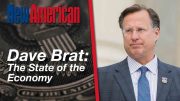
For one thing, although GM’s life span may have been extended by a few months thanks to this latest government action, the reality is, as David Whiston of Morningstar.com recently pointed, that GM is a "dying company and further restructuring and sacrifice by all stakeholders is needed now." With GM, at least, this is unlikely to occur, thanks in no small measure to the insistence by the UAW, the autoworker’s ossified union, that wages, benefits, and retirements not be affected one iota by GM’s de facto bankruptcy. Because of the union’s coercive demands, GM has been unable for many years to produce competitively priced products against foreign auto manufacturers, like Toyota, whose American plants are unencumbered by union politics.
The fate of Chrysler has yet to be determined at the time of this writing. The federal government (i.e., the Bush administration, since it was the executive branch that decided to bail out GMAC after Congress refused to authorize a bailout) has not yet decided whether to vouchsafe some of the coveted $700 billion in bailout moneys to rescue Chrysler Financial, the financing arm of Chrysler Corporation.
An interesting point that GMAC and Chrysler Corporation have in common is their relationship with Cerberus Capital Management, the global financial behemoth that is one of the world’s richest hedge funds, which has a 51 percent ownership stake in GMAC and near-total ownership of Chrysler Financial. By all indications, Cerberus is flush with funds, yet declined to infuse any of its own cash into its ailing automotive dependents. The fairly obvious inference is that Cerberus — whose board is packed with D.C. insiders like former Vice President Dan Quayle and former Treasury Secretary John Snow — is hoping for taxpayer-sponsored bailouts to enable GMAC and Chrysler Financial to limp along until it can find corporate suitors for the crippled automotive giants.
These facts were not lost on Senator Bob Corker of Tennessee. "Cerberus owns 80% of this company [i.e., Chrysler Financial] and has cash — lots of cash — that they are unwilling to put into this company," Corker said in December hearings. "It troubles me a little bit knowing that basically all we’re really doing is providing a little capital for y’all to hang around long enough to get married [i.e., merge with a corporate suitor]."
The GMAC bailout, and any future Chrysler Corporation bailout, is looking very much like a cynical handout to well-connected financial interests — a sop to Cerberus, as it were — that stand to lose from the impending automotive debacle, before allowing GM and Chrysler to liquidate anyway.
This sort of thing has been done before. Back in 1932, when the railroads were the industry deemed too big to fail and J.P. Morgan ruled the global financial roost, President Hoover’s Reconstruction Finance Corporation — the Depression-era equivalent of the Emergency Economic Stabilization Act of 2008 — loaned the then-considerable sum of $5.75 million to Missouri Pacific Railroad to enable it to pay off its debt to J.P. Morgan and Company. No sooner had the debt been paid than Missouri Pacific was allowed to go bankrupt. The big stakeholders in the railroad and the bankers that owned its debts were happy, and the American public was stuck with the bill.
The unalloyed truth is that the bailout of GMAC and any similar actions on behalf of Chrysler or Ford are unlikely to affect the long-term realities facing the U.S. automotive industry. With the big railroads back in the 1930s, government bailouts had little effect other than to give the well-connected time to cut their losses. Those railroads that survived at all had become nationalized and horribly inefficient, and continued to lose money for decades to come — all at taxpayer expense.
In the case of the Big Three automakers, GM is irretrievably bankrupt, with shares trading at levels not seen since the Korean War. Chrysler, already the beneficiary of one high-profile bailout during the Carter administration, is in the same boat, and Ford is probably not far behind. No amount of bluster by politicians or union leaders can change these inescapable economic facts. The only remaining question to be answered is: how many more of the world’s wealthy and well-connected will benefit from U.S. government largesse before the Big Three are permitted by the powers that be to go gently into that good night?



